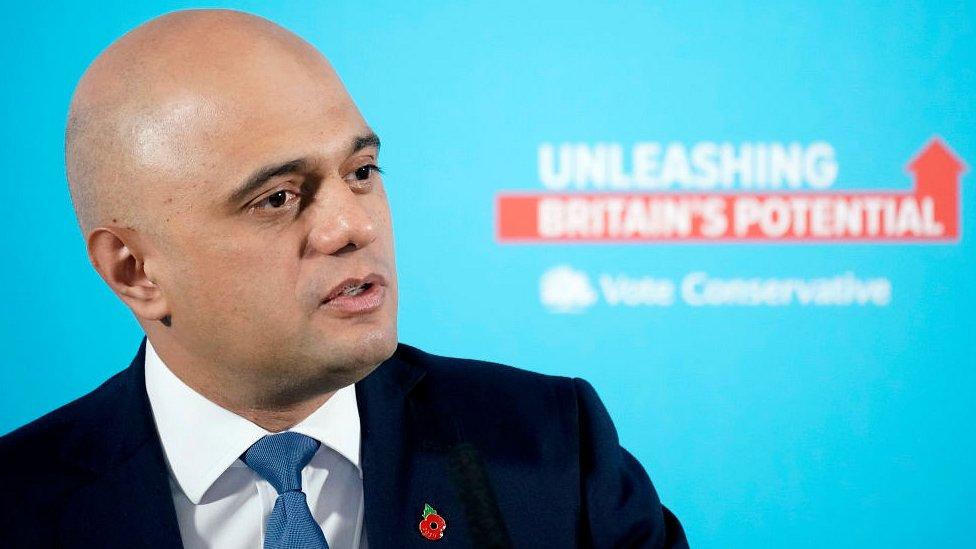General election 2019: Sajid Javid EU trade deal claim fact-checked
- Published

Chancellor of the Exchequer Sajid Javid has said there was not "a single doubt" in his mind that the UK would "have agreed and finalised a very ambitious deep and comprehensive trade deal" with the European Union (EU) before the end of next year.
That's when a post-Brexit transition period is due to come to an end.
""Because there's already an agreement, there's already an agreement in principle. It's there," he told BBC Radio 4's Today programme.
But this is not the case.
Tough negotiations
What the UK has agreed is the political declaration - a non-binding document setting out the broad direction of travel for negotiations with the EU after Brexit.
That document says both sides want "an ambitious, broad, deep and flexible partnership across trade and economic co-operation", based on "a balance of rights and obligations".
But the precise details still have to be negotiated.
And while "Get Brexit Done" may be a good campaign slogan, slogans don't make trade agreements.
Trade agreements are made by tough decisions, technical negotiations and trade-offs. It's not the same thing.
March 'start date'
Mr Javid said that since Boris Johnson became prime minister the UK had not only negotiated a revised withdrawal agreement with the EU, but had also "negotiated… the outline of a trade agreement".
In fact, the EU is not allowed by law to conduct any formal negotiations on a trade deal until after the UK has left. And if Brexit does happen on 31 January, the other 27 EU countries would then need to approve a joint negotiating mandate.
That's a process which could take about six weeks, if things go well. So it is unlikely that formal trade negotiations would begin until about mid-March, leaving very little time to discuss the detail.
Ratifying any agreement before the end of next year would take several months, so the negotiations themselves would need to be completed by the summer.
Trade deals normally take several years to negotiate.
The government argues that its deal with the EU is different from other deals because the two sides are already fully aligned when it comes to rules and regulations.
That is true - and neither side has an interest in dragging things out. A lot of preparatory work has been done.
But a basic rule of trade agreements is it's not about where you start, it's about where you want to end up.
Level playing field
The UK has made clear that it wants to diverge from EU rules, which will make it more difficult to get a trade agreement done quickly.
Both sides have talked about a "zero tariff, zero quota" deal for goods, meaning no extra taxes on imports or limits to how much you can buy and sell from each other.
Confused by Brexit jargon? Reality Check unpacks the basics.
But the EU will be seeking guarantees that the UK intends to respect what are known as "level-playing-field" measures on things like workers' rights and environmental regulations.
That's the idea that countries keep their rules and standards closely aligned, to stop one country giving their businesses a competitive advantage - for example by having lower standards and so lower costs.
Alongside a deal on goods, there's also the question of services - a huge part of the UK economy - which could take longer to resolve.
So a key question for the UK is how it intends to maintain full market access to the EU - its largest trading partner - while also moving away from the current rules of the game.
Any number of issues could hold things up.
'Ambitious' timetable
It's also important to point out that post-Brexit arrangements are not just about trade - they're about security, immigration, fishing, educational programmes, data-sharing and so on.
There are all sorts of things that the government is promising to sort out in record time.
So it is an incredibly ambitious timetable, with no guarantee that it can all be done before the end of next year.
And it's worth remembering that if trade talks are not completed by December 2020, when the transition period ends, there is the prospect of the UK having no formal trade agreement with the EU at all.
The transition could in theory be extended by one or two years, but Boris Johnson has insisted that there will be no extension.
Government ministers have been asked repeatedly during this election campaign whether they will rule out leaving with no deal at the end of 2020, but none has been prepared to make that commitment.
Instead they are following the prime minister's lead and insisting that everything will be done on schedule.
"If you say, can you absolutely guarantee we'll get a deal," Mr Johnson said at a campaign event today, "I think I can."


